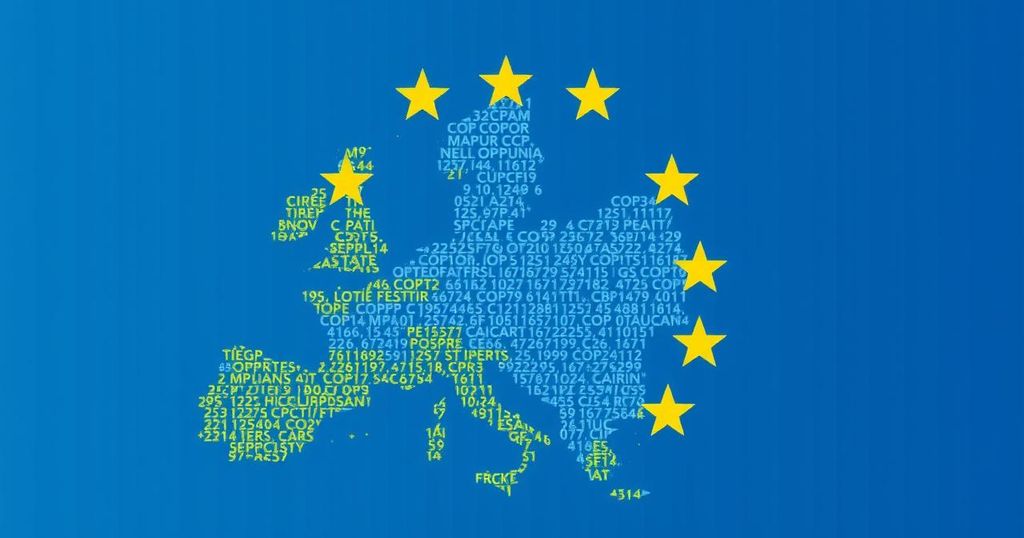Europe’s Essential Leadership Role in Achieving COP29 Climate Goals

At COP29 in Baku, the European Union is pivotal in negotiating a climate deal, engaging with China and developing nations amidst scrutiny after US elections. The EU contributed €35.8 billion in climate finance last year, striving for carbon neutrality by 2050 while navigating internal austerity concerns. Nations like France and Germany lead in contributions, but ongoing negotiations face challenges in defining future commitments and ensuring equity among global partners.
At the COP29 climate talks in Baku, the European Union is positioned as a crucial player in negotiating a climate deal, especially in the wake of President Donald Trump’s election victory in the United States, which has been viewed skeptically regarding its commitment to global climate action. The EU’s delegation is actively engaging with both China and developing countries, fostering alliances that emphasize ambitious climate goals. This positions Europe not only as the largest contributor to global climate finance but also as a leader in efforts to address climate change globally. The European Commission reported that in the last year alone, the EU contributed a total of €35.8 billion towards climate finance, with approximately a third of the funds raised by developed nations aimed at supporting the climate initiatives of developing countries. The bloc is pursuing a target of carbon neutrality by 2050, reinforcing its commitment to global climate leadership amidst scrutiny regarding its historical emissions and current austerity measures. EU climate commissioner Wopke Hoekstra expressed the EU’s dedication to maintaining its leadership role despite potential financial burdens, stating, “We will continue to lead, to do our fair share, and even more than our fair share, as we’ve always done.” However, there remains hesitance among EU nations to disclose specific future commitments, which complicates negotiations. Countries such as France, Germany, and Sweden are noted for exceeding expectations in financial contributions, contrasting starkly with the US, which lags in climate financial support. While some critique Europe’s past reliance on fossil fuels for prosperity, calls for a stronger commitment towards equitable climate action are echoed by representatives from developing nations, reminding Europe of its responsibility to pave the way forward. The COP29 discussions aim to mobilize increased funding to empower developing countries in establishing sustainable infrastructure, such as solar energy projects and climate-resilient urban areas. Negotiators have set ambitious funding targets ranging from $200 billion to $400 billion annually from Western nations, significantly above the current $100 billion commitment. This negotiation process includes discussions on broadening donor definitions to include private sector contributions, which the EU is strongly advocating for, including voluntary contributions from countries like China to ensure these are accounted for transparently. Significantly, the continuity of commitments made at COP28 is a major priority at COP29, with EU officials emphasizing the global community’s need to maintain momentum against fossil fuel dependency, as reiterated by Climate Commissioner Hoekstra who stated, “We, as a global community, cannot afford to backslide.” This reaffirms the urgent necessity for coordinated international efforts to combat climate change effectively.
The context surrounding COP29 highlights the European Union’s strategic importance amidst shifting global climate dynamics, particularly following the 2020 US elections. Historical emissions and EU financial commitments play critical roles in shaping negotiations, especially concerning aid for developing nations. As climate change increasingly presents existential threats, discussions at COP29 represent an opportunity to consolidate EU leadership while engaging with global partners on climate finance and sustainable initiatives.
The European Union stands at the forefront of negotiations at COP29, poised to shape the future of global climate action through strategic alliances and significant financial commitments. As the largest contributor to climate finance, Europe faces both opportunities and challenges in delivering on pledges made, particularly in fostering sustainable practices among developing countries. The EU’s actions in Baku are crucial to sustaining momentum in the fight against climate change, with the expectation that it will lead by example in international collaborative efforts.
Original Source: www.france24.com








